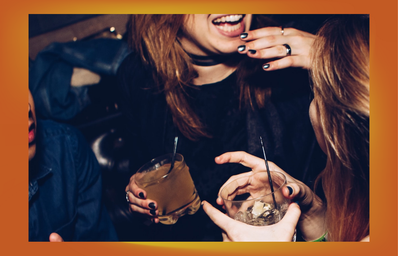The holidays are approaching, and I’m not talking about Christmas, or Thanksgiving, or even Black Friday — I’m talking about a little small-town tradition called “Blackout Wednesday.”
If you’re not from a small town where this is normal, I’ll explain the meaning. Blackout Wednesday is the Wednesday before Thanksgiving where everyone (and I mean everyone) you went to high school with packs your crappy hometown dive bar for some kind of unofficial high school reunion. Everyone spills so much tea from high school, and gets picked up by their parents or older siblings — and you won’t speak to them again until next year. (If you’re. celebrating it this year, please be responsible — it may be called Blackout Wednesday, but nobody should actually be blacking out.)
While catching up with the class clown or your favorite lab partner from sophomore year can be an absolute blast, there’s a certain danger that lies in Blackout Wednesdays, and I’m not talking about the Thanksgiving hangover. I’m talking about seeing your high school bullies years later.
Since going to college, a lot of us have been able to get over being bullied in middle and high school. We’ve matured, grown a thicker skin, and realized that a lot of bullying came from a place of insecurity. Whether the bullying was simply passive-aggressive or a more serious form of intimidation, there’s still no denying that those wounds from high school still haven’t healed completely. And seeing the bullies that caused that hurt is just like pouring salt all over those wounds.
Not to mention, those nerves can be enhanced even more by those vodka crans you’re slinging back. According to a 2015 study done by Alcohol.org, of 15 million people surveyed, 28.4% of people aged 21 to 29 reported feeling a heightened sense of anxiety after consuming alcohol. The cerebellum (that “little brain” located at the back of your brain) is the most sensitive to the effects of alcohol, being that it has the ability to control functions like memory and emotions.
Luckily, Dr. Lauren Cook, a relationship therapist, provided some insight on how to navigate this sticky — and anxiety-inducing — situation.
“We have a very powerful memory center in the brain, the hippocampus, so it’s understandable that when we see people from high school (especially later in life), it brings us right back to those dynamics when we were a teenager,” Cook tells Her Campus. “This can be mentally and emotionally jarring because we can logically hold that life has likely changed but emotionally, we may feel exactly the same as we did back then when we see someone from our past. Pair that with the fear response in the brain (the amygdala) because we don’t know how the person will respond. It’s a recipe for feeling nervous.”
But this doesn’t mean that you should up and leave the bar (and your friends) when you encounter those high school tormentors. If anything, Cook recommends you stick around and feel out the vibes before instantly dashing.
“It can be so easy to jump to conclusions and assume we know how an interaction will go with someone from our past. However, sometimes we forget in that moment that we have likely changed quite a bit and so has the other person,” Cook says. “The bully from our past may have had a major realization in the years since and may want to amend the past. Or they could be the exact same person as they were in high school … it just may be helpful to hold an openness for human change before you jump to that conclusion.”
In the event you encounter your high school bully, it’s best to approach that person with an open mind, and a kind heart. Who knows? Maybe they’ll offer an apology for the way they treated you, or maybe even buy the two of you a round of shots in alternative to a heart-to-heart. And if they’re still that mean, catty person they were almost five years ago, what does that say about them? You’re probably better off leaving that bridge burned.
“It can be easy to feel intimidated when we see our old high school bullies. When you enter that space, hold on to something you’re proud of about yourself. How have you grown since high school? How have you changed?” Cook advises. “This can help give you that confidence boost if you’re feeling overwhelmed by seeing them. You deserve to be there — stand your ground. However, if you’re feeling threatened or not having a good time, no one is making you stay, either. You get to decide.”
If you go out on Blackout Wednesday, have fun with your friends, and drink responsibly with those kids you barely talked to in high school. Bullies or not, you deserve to have a good time. And if those people are still out to get you after years in college, maybe it’s time to realize who the real losers are.
Expert:
Dr. Lauren Cook, Therapist


